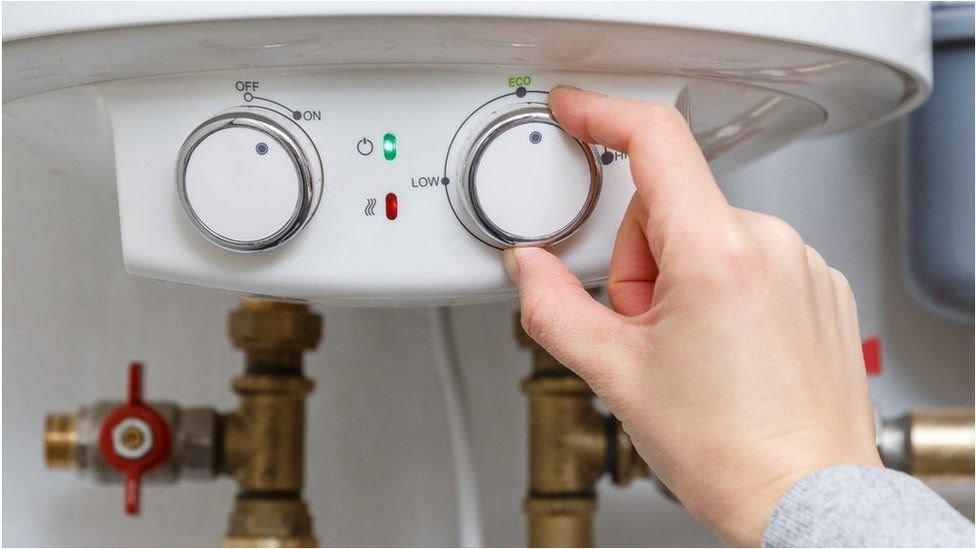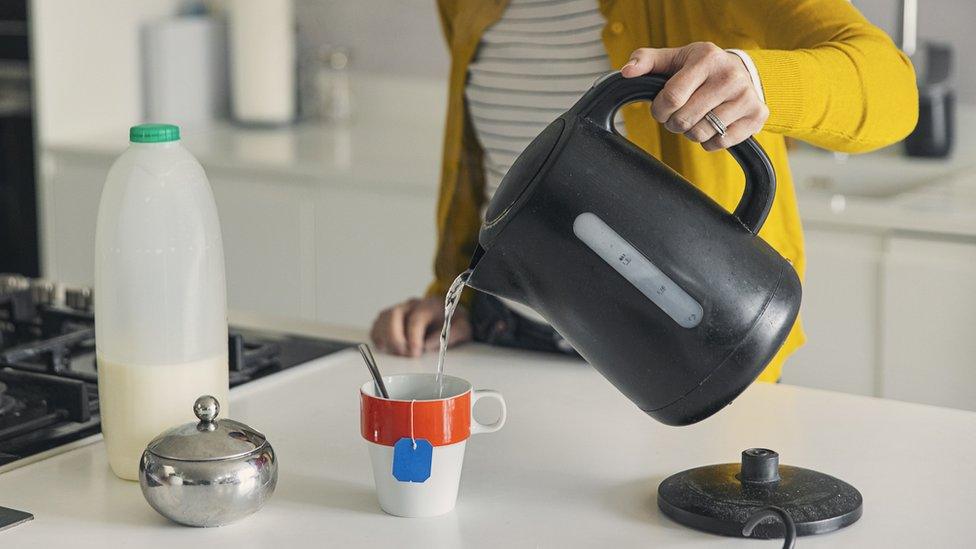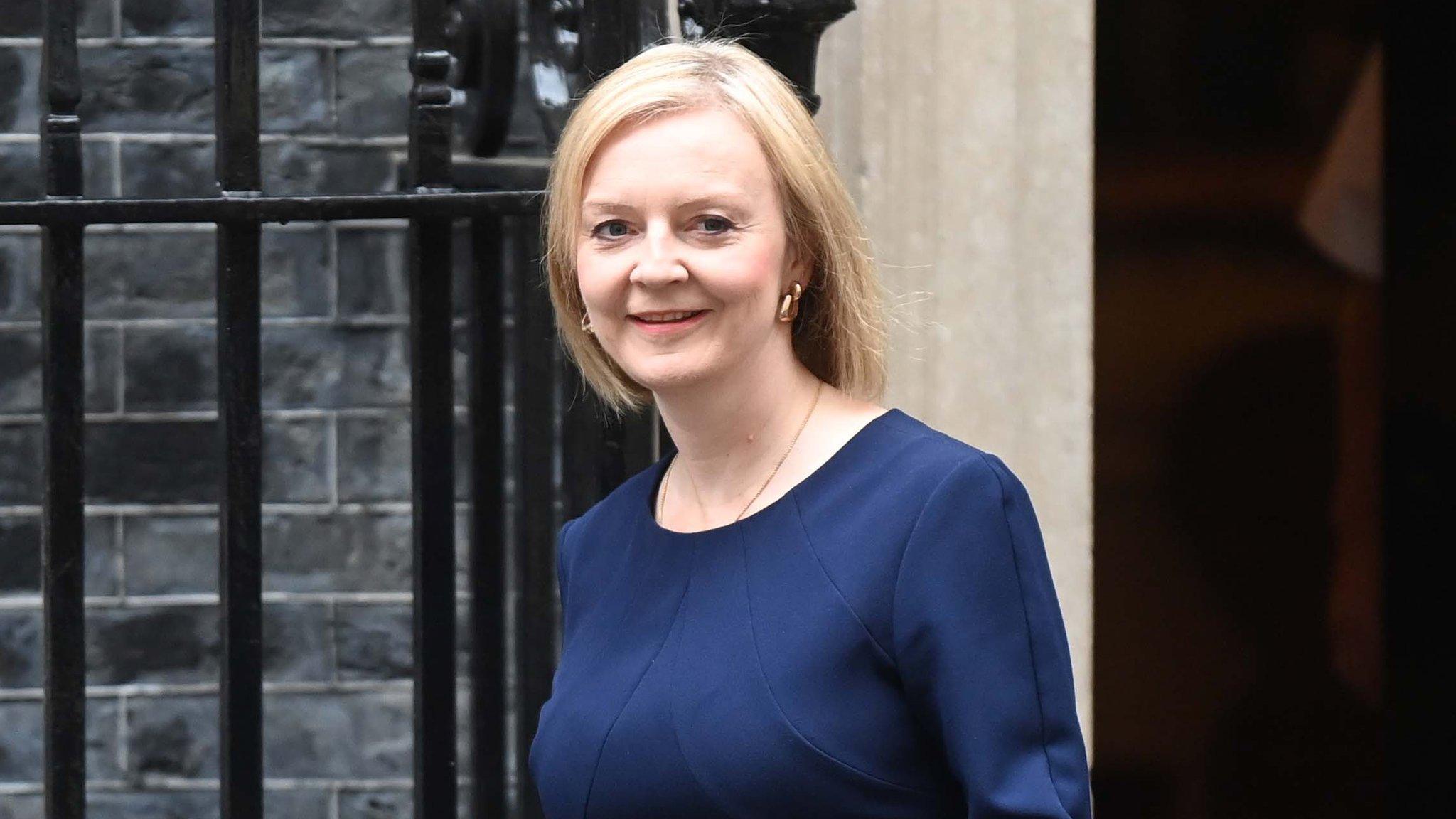NI households to receive £400 energy support in November, says Truss
- Published
Prime Minister Liz Truss's full interview with BBC News NI
Households in Northern Ireland will get a £400 energy support discount in November, Liz Truss has said.
The prime minister said the payment would be backdated to 1 October - the same date when households in GB receive their electricity bill discounts.
The prime minister told BBC News NI in an interview she wanted to assure people in NI that they would receive the same level of support.
Ms Truss rejected criticism about Friday's controversial mini-budget.
The chancellor's announcements led to led to a massive drop in the value of sterling and a surge in borrowing costs.
It also raised concerns about increased mortgage payments for home owners.
"We have taken decisive action because people were facing energy bills of up to £6,000, high inflation and an economic slow down," Ms Truss said.
"The action we have taken will ensure people are paying no more than £2,500 on a typical energy bill this winter and next winter and that will help to reduce inflation by up to 5%."
She added: "We are also taking action to spur economic growth to avoid a very severe slow down which would have very bad consequences for people in Northern Ireland."
'People need government'
But the prime minister also warned to get "help to people on the ground" she wanted to see the Northern Ireland Assembly and executive back up and running as soon as possible.
"People need government," she said.
Asked if she had made any direct approaches to Democratic Unionist Party (DUP) leader Sir Jeffrey Donaldson to get his party back into the power-sharing executive, the prime minister would only say: "I have made it clear to everyone I have spoken to that I want to see the assembly and executive operating."
On the Northern Ireland Protocol, the prime minister said she remained open to finding a negotiated solution with the EU "but only if it fixes the problems the government has identified".
She said those included restoring the "primacy of the Belfast Good Friday Agreement so that we are treating both communities in Northern Ireland fairly".
She added: "That means having free flowing east-west trade as well as free flowing north-south trade and it means making sure people for Northern Ireland can benefit from the same tax benefits as the people of Great Britain."

What is the protocol?
The protocol is the part of the Brexit deal that keeps Northern Ireland in the EU's single market for goods, avoiding a hard border with the Republic of Ireland.
The arrangement ensured free trade could continue across the Irish land border, which is a sensitive issue because of the history of conflict in Northern Ireland.
But the protocol brought in some new checks on goods moving between Great Britain and Northern Ireland and has been criticised by unionist politicians.
However, the majority of politicians elected to the Northern Ireland Assembly in May's elections support the arrangements.
The Democratic Unionist Party (DUP) has refused to re-enter a power-sharing government in Northern Ireland until its concerns about the protocol are resolved.

The prime minister also warned of allowing the current crisis to "drift" and repeated her commitment to bringing through the Northern Ireland Protocol bill "to fix some of the problems".
But she was unable to say if and when the negotiations with the EU would resume after the formal talks ended in February.
The prime minister also refused to reveal if any deal with Brussels required the support of the DUP before being accepted by London.

Analysis
Liz Truss remained silent for much of the past week as her mini-budget stirred a maxi-economic storm.
Today, she came out fighting in 24 separate TV and radio interviews across local regional BBC output, all pre-arranged ahead of the Conservative Party conference this weekend.
She had a script and she stuck to it for all of the five-minute interviews.
Talking up the positives of her mini-budget and glossing over the massive challenges it has triggered for the UK economy.
The political and protocol problems in Northern Ireland were almost a welcome distraction.
But she didn't move from her well-rehearsed lines, fixing the protocol through a negotiated solution first and, if not, through legislation.
We learned nothing new from our sit down in Number 10 and that will please team Truss.

Related topics
- Published29 September 2022

- Published26 August 2022

- Published29 September 2022
